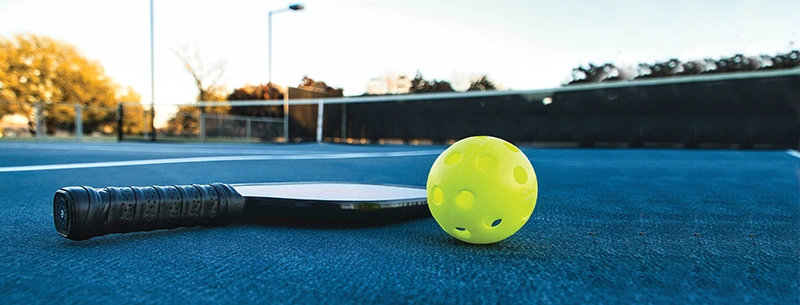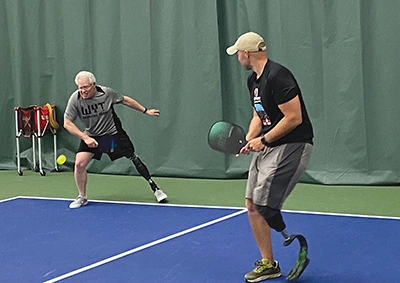. . . and one reason they shouldn’t.

“It’s a lot easier to get proficient at pickleball than to get proficient at tennis,” says Chris Bretoi. A serious tennis competitor in his twenties, Bretoi switched to wheelchair tennis after losing his left leg in the late 1980s, then turned to pickleball a few years ago. The sport has become huge among aging Americans because it offers all the fun of tennis without all the physical demands. Those same qualities make it a great option for amputees who want to stay active, Bretoi says.
Here are some reasons you should consider it—and one note of caution.
It’s easy to learn. This spring, Bretoi and Wiggle Your Toes arranged two introductory pickleball clinics for amputees in the Twin Cities area. “Most of the players were complete newbies not only to pickleball, but to racket sports in general,” Bretoi says. But after just half an hour of instruction, everybody had the hang of it and graduated from drills to actual games.
It’s accessible to average (or below) athletes. A pickleball court is much narrower and shallower than a tennis court, so there’s less ground to cover and less distance to propel each volley. In addition, the game uses oversized rackets with a high margin for error; you don’t have to hit every ball square to keep it in play. Bretoi says it’s more like ping-pong or badminton than tennis—less about speed and power than about strategy and precision.

It promotes physical and mental health. In addition to giving your heart and lungs a decent workout, pickleball boosts everyday mobility by improving your balance, lateral movement, and overall confidence. It’s also a great social outlet, and it tends to normalize limb loss because you can easily play with (and against) your able-bodied buddies. “It’s a very friendly game,” Bretoi says. “Most players aren’t super competitive.”
It’s affordable. You don’t need any specialized prosthetic equipment to try pickleball out, says Bretoi. Beginning and intermediate players do just fine on an everyday prosthesis, although you might want to wear an athletic blade if you ever get serious. A starter racket only costs about $25, and most pickleball centers will let you use a loaner if you’re brand-new to the sport.
It’s addicting. This is the reason not to take up pickleball. “I know people who play every day,” Bretoi says, although he doesn’t know anyone whose fervor has gotten out of hand. But if you Google “pickleball addiction,” you’ll find tales of people who canceled vacations, postponed medical treatment, and ended relationships over the game. You can buy “pickleball addict” merchandise and join pickleball-widow support groups. There are worse things to be addicted to, of course. But if this sport ends up ruining your life, don’t say we didn’t warn you.
Where to play
Find a pickleball facility near you at usapickleball.org/play/places-2-play or at pickleballuniversity.com.




